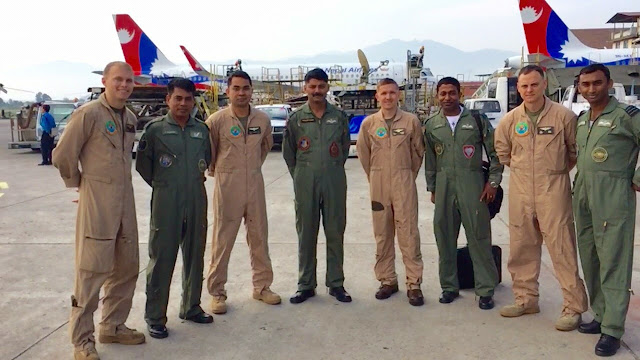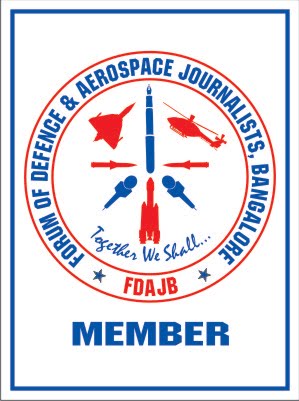 |
| @writetake |
Nepal has come in terms to the mighty blow from nature. India has shown the world its ability to mobilize massive resources to help a friendly nation. The media has probably shown how even a natural calamity can be reported with the same fanfare as a football match! And, the armed forces have again demonstrated their ability to do their job, as per the brief, sans any noise.
In this exclusive feature report, OneIndia gained access into the minds of a few Indian Air Force (IAF) pilots who are still undertaking relief operations in various parts of Nepal.
They had only one condition. “Do not put our names and ranks. We are the IAF here to help our brothers and sisters.”
After minor communication glitches owing to hostile weather, the hotline between Kathmandu and Bengaluru was established. A senior Indian Air Force (IAF) official at the Head Quarters in New Delhi ensured that boys were on talking mode.
“It’s all clear? Shall we start,” I asked. “Roger. Go ahead,” came the reply. And probably some first-time accounts of Operation Maitri began to unfold.
Hours after Nepal was ripped apart by the devastating quake, six IAF Mi17s and Mi17V5s were airborne. They had a night halt at Gorakhpur and next day they landed at the Tribhuvan International Airport in Kathmandu.
The entire operational group had around 80 people consisting of pilots, tech team, ground liasoning staff and a Task Force Commander. This team had been stationed in Nepal for the last two weeks.
Villagers present ‘sacred scarf’ as gift to pilots: The villagers, who have now become familiar with the pilots, easily identify them every time a helicopter lands with relief materials.
“For the villagers we are all Captains. The moment they spot us, the people start screaming Captain! Captain! They have presented us with their ‘sacred scarf’ which is normally tied at the highest point in a village to know the wind pattern,” says a pilot flying the Mi17V5.
According to him, the villagers believe that anyone who is a saviour to their nation is saviour to them as well.
“At Satyadevi village in Milanche district, a young village secretary was the first to honour us with the sacred scarf. When we landed there, he (secretary) travelled with us to show the village. We gave away our ration including biscuits and water,” says the pilot.
The IAF crew said that the children in most villages were very curious to see the helicopter. “We were moved by their discipline. No messing around. They were all very organized and the village heads ensured that there was no chaos,” says another pilot.
In Lukla village, the crew spotted a stranded tourist team. “Initially, we did not know that they were Indians. Later were told that they came from Maharashtra. They were closer to the Everest Base Camp. Lukla has one of the10 difficult airfields in the world. It was another challenge for us,” recalls another pilot.
Villagers wait for pilots with garlands: They said in some areas the moment they landed, the villagers were ready with garlands.
“Some have become familiar with our names as we have done multiple sorties to their areas. We have been told by the locals that they are offering prayers every day in our names. Honestly, these are first-time experiences for us,” an officer said.
They said operating choppers in the Himalayan ranges can be very dangerous. “The terrain is an unforgiving one. A lot of coordination is required while setting out on a mission here. The co-pilot has a tough task on hand in guiding and even the flight gunner (also known as the loader) plays a pivotal role,” he says.
Most pilots parted with their ration as well: During the initial days of Operation Maitri, every pilot parted with their ration seeing the plight of the people.
“During the initial few days after the quake there was severe water scarcity. This was mainly due to pipeline bursts and other damages. So, we parted with our water as well. Things have improved now,” says another officer.
When asked about the most striking moments of their rescue operations so far, the crew said that it was during shifting the dead bodies.
“In one instance in Langtang Valley we were carrying the bodies of six trekkers and they were all mixed nationals. Some could not be identified. We saw a severed half of one body as the other half was missing. In the IAF we are taught to be mentally tough. We felt sad but we had a job on hand. Another sortie to be undertaken,” recalls a crew member.
Not affected by the anti-Indian rant: When asked whether the anti-Indian rant in Nepal has had any effect on their mission, the IAF crew said that their missions kept them focused.
“We came to know from our family members back home about these issues. We do not bother about what’s appearing in the media. We have a job on hand and we are all so focused,” says an officer.
Most of the members had slept only for four to five hours during the initial days of operation. The crew members also recall the services of the Army Aviation flying the Dhruvs in Pokhara.
Nepalese Army got home-cooked food for IAF pilots: When asked about the role played by the Nepalese Army, the IAF men were univocal in their responses.
“We never felt that we are in another country. We were all touched by the gesture of the Nepalese Army when they got us home-cooked food during the initial days. We all sat together and ate. They also assisted us with digital images so that we become familiar with the terrain,” says a pilot.
Finally, when one of the members reminded this Correspondent about their next mission, hence signaling that the interview should be wound up, the last question was fired.
What will be the one key take-away of Operation Maitri? “Well, not one may be two. First, the experience of undertaking missions under extreme hostile conditions. And, second, the warmth of the people. Their love,” a soft-spoken voice on the other side said.
When the hotline snapped, it was overcast in Bengaluru. Apparently, in Kathmandu as well!
This report first appeared on OneIndia


























